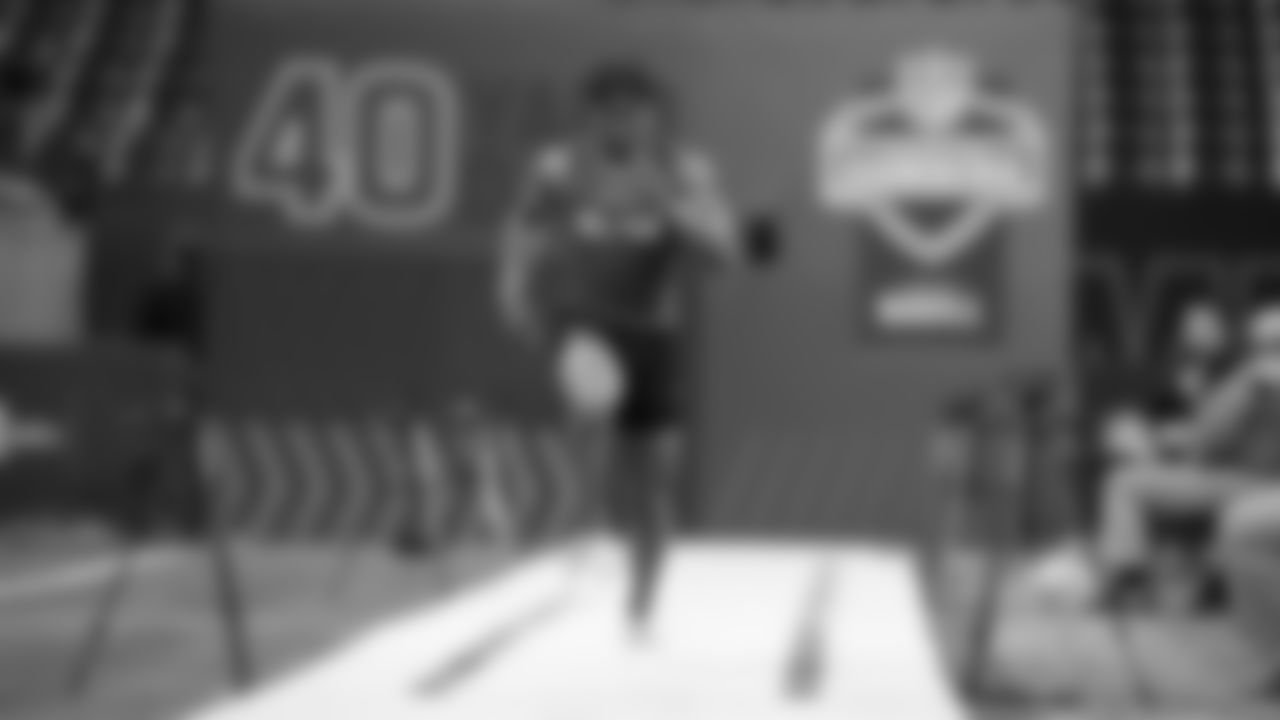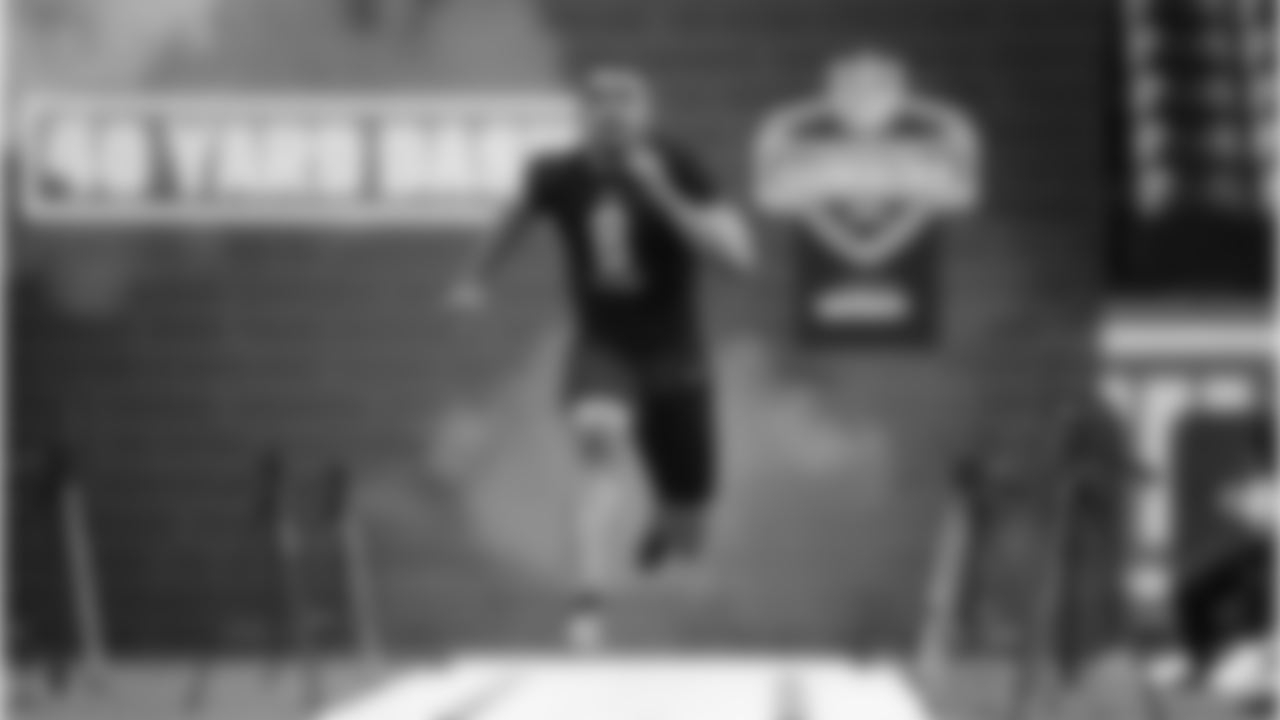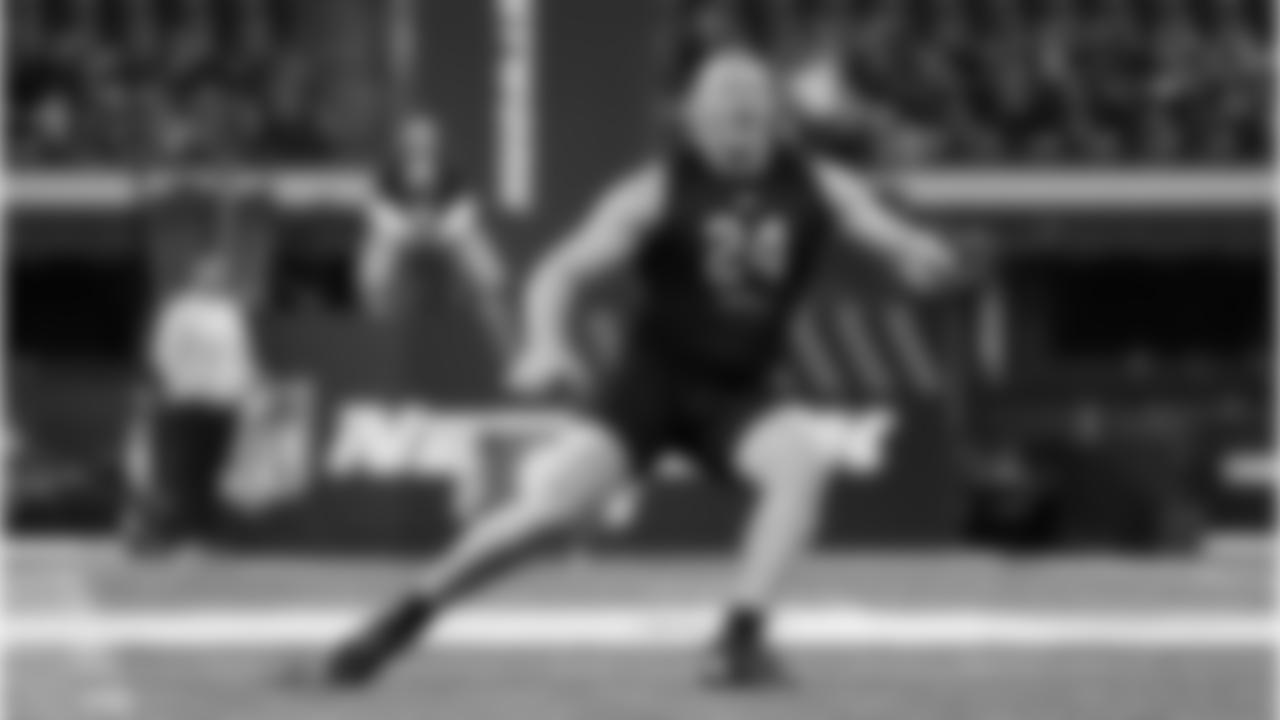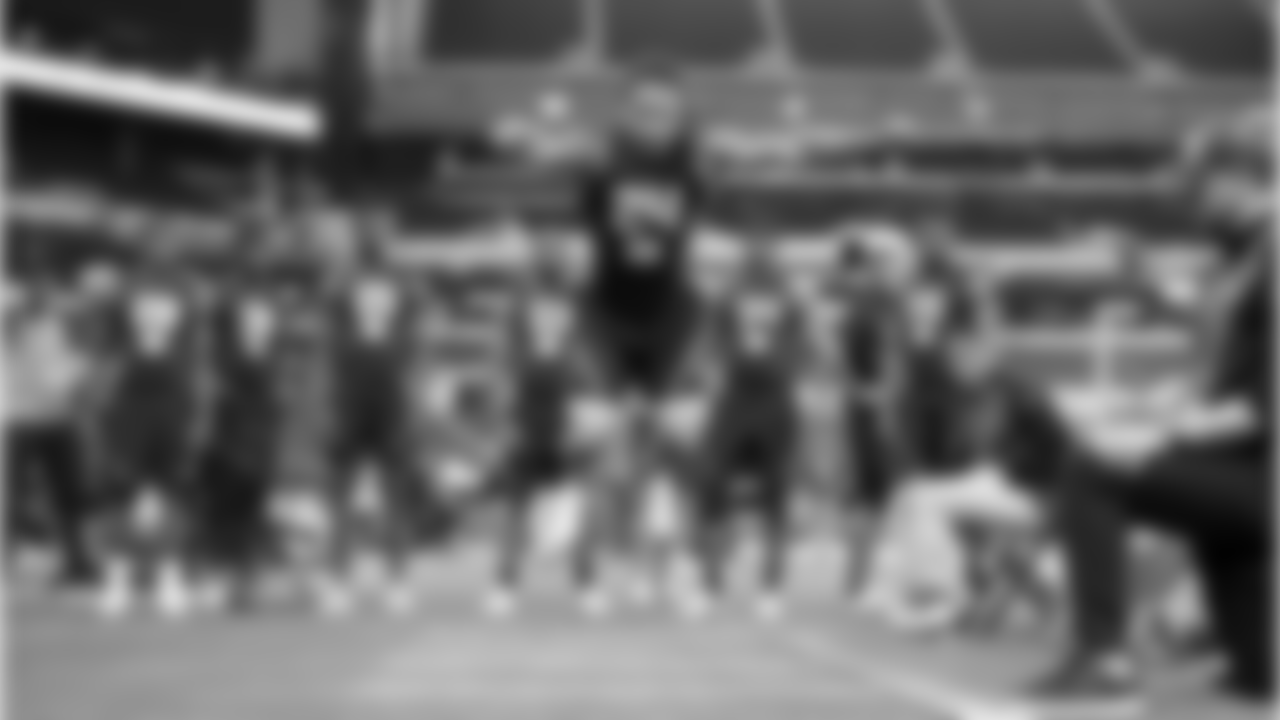INDIANAPOLIS – The entire NFL ecosystem convenes in downtown Indianapolis this week for the NFL Scouting Combine with plenty on the agenda. While this event centers around preparation for the 2024 NFL Draft, free agency buzz is afoot, contract details are getting ironed out as teams try to re-sign their own players, and coaches and scouts around the league meet to talk shop.
From a draft standpoint, more than 300 prospects are put through the wringer. Players go through medical exams, psychological evaluations, athletic testing (which I previewed in a series of "cheat sheet" pieces that you can find right here), and many, many other obligations. Among those obligations are the various meetings they have with individual NFL teams.
These meetings can be broken up into two buckets: formal and informal. Informal meetings are, by design, less structured. Coaches and scouts can try and set up times with players and chat one-on-one for as long as they'd like. The formal meetings, however, are much more rigid. Every team gets 20 minutes with up to 45 players over the course of the week. These meetings happen in suites at Lucas Oil Stadium, and are the ones you may have seen in behind-the-scenes videos of in pieces like Eagles Unscripted, presented by Lincoln Financial Group. There are 32 teams in the league, and it very well may be that there are 32 different variations to these meetings.
Some teams spend those 20 minutes just watching film, while others focus on off-the-field questions and concerns.
Some clubs keep it light and fun, while others have a more serious and – at times – purposely adversarial atmosphere.
Some franchises have dozens of people in attendance, while others have just one psychologist in the room leading the discussion.
While the actual process and execution of these formal interviews can vary greatly across the NFL, the general goal is the same: How can you get further insight into a potential draft pick? Can you get a better idea of what makes them tick?
When you work for one organization over a long period of time, like Eagles Assistant General Manager Alec Halaby (now in his 15th Combine here in Philadelphia) has, you've seen a little bit of every approach. With changes over the years to both the scouting staff as well as on the coaching staff, the plan of attack at these events evolves.
"I would say that there is definitely variation from coach to coach," said Halaby, who has been a part of drafts involving four different coaching staffs. "Everyone takes a different approach with what they want to learn from a formal interview ... and there's going to be different emphasis there in those discussions. Some teams will want to learn more about a player's motivation off the field, while others may want to see how a player talks about the game or how much football they can spit back to us."
Eagles Director Player of Personnel Charles Walls is here for his second Combine with the Eagles (and 12th overall in the NFL). Conversely, he has seen how other franchises have gone about it in Green Bay (where he worked under two different GMs) and in Cleveland, before coming to the City of Brotherly Love.
"Every organization I've been with has a bit of a different mindset," Walls explained. "There may be a different format, a different structure in order to gather the information you want to get out of that interview."
In Philadelphia, collaboration has always been key. That togetherness shows up in this atmosphere.
Walls explained further that it is truly an all-hands-on-deck approach from both the scouting and coaching staffs. "It's definitely more collaborative," he added.
How do you know what questions should be asked in this setting? With dozens of meetings happening over the course of a few days, there is certainly some crossover, but there's also room for personalization as well.
"There are some general things we want to learn about every player ... so like any interview, you ask a number of candidates the same question and then compare all of their answers," Halaby explained.
But then, when you dive into the film, that's where things can change. Position coaches pull a lot of plays specifically for this meeting. Sometimes those plays are positive, sometimes they're negative. They may be scheme-focused or they may be execution-focused. Some players get a handful of plays to go through for long, in-depth periods of time. Others get a lot of plays to speed through in rapid-fire fashion.
"You have to figure out what you want to ask a player that will solicit good dialogue," Halaby said, "and it takes a lot of time to decide which plays are going into the tape and how to sort them."
For instance, if there's a linebacker who doesn't play blocks correctly, or a running back who consistently goes through the wrong gap on a certain scheme, you show him a few examples of that occurring. Then you ask him what his thought process was on those plays, if he felt he did a good job, how he was taught to handle those situations, etc. All of these questions can help get you to your final destination.
"Even if it's a minute detail like, 'What were you thinking here?' or 'What were you communicating there?', it's great to just get perspective from the player to see how they saw a play," Walls said. "Because no matter what, the scheme is going to be different here. So, it's not necessarily about a 'right' or 'wrong' ... it's more about how they think about the game and how they're able to process."
By the time the Eagles set foot in Indianapolis, some prospects have had reports based off film study written by three or four different scouts, not including anyone from the coaching staff, so it stands to reason that there could be a handful of those kinds of process questions from each of those individuals for a player when he walks in the door. That's where the collaboration comes back into play.
"What I love about it is, since we are in constant communication as a staff, 'MY' individual question becomes 'OUR' individual question," Walls said.
So, if a meeting ends and not all of the questions get asked in the formal setting, everyone is still on the same page with getting it answered. Whether that answer comes here in Indianapolis or if it's at a Pro Day, a private workout, or a Top 30 visit later in the spring, any questions the staff as a whole had for a player will get answered.
The communication amongst everyone in the entire football operations department also requires a good amount of trust. A good example is how the coaches and personnel staff all lean on the area scouts.
There can be a lot of people in the room for these interviews, and for almost everyone, this is their first exposure to the player. But it's the area scout who will be the most well-versed on the player, having visited his school multiple times going back to last summer. They are the ones who set the expectations going into this meeting.
"As an area scout, I knew what to expect from a player when he walked in the room," Walls explained. "But now, in this role, hearing them talk for the first time, I have to read them through the lens of the scout. Does this match with the reports that I read?"
In that way, these interviews are very similar to the drills that everyone watches on television. Area scouts go through schools and write up reports on every draft-eligible player there. Those reports will include on-field and off-field analysis, and this week is about checking those boxes to see that those things match up in this environment.
The adage is that, at the Combine, you expect fast players to run fast, and slow players to run slow. It's only notable when the opposite occurs. When that happens, you go back and double-check your work. The same thing occurs with these interviews. If a scouting report says that a player is really well-spoken, coachable, and everything you want from an intangibles standpoint, but things seem to go against that in this formal setting, then you go back and do a little more digging into the "why" behind it.
"Those are some of the most interesting cases," Halaby explained. "Where a scout has an impression of the player, but then they come into a room with us for 15-20 minutes and we see something different ... there have been examples of guys in the past who came in for an interview late in the day and it was clear that he was ready for the day to be done, and it was not a good interview. And that was different than what you had heard from his coaches, who said how much he loved football and how great he was away from the field. Well, I talked with him at his Pro Day, we had him in for a Top 30 visit, and it was a different experience. He was much better. The guy is a good player, but we had one bad exposure that was not fully representative of the player ... so the scout did everything right. They talked to everyone. It was a great account of exactly what they could discern from the school, but in that environment, the player responded differently."

That's why all of these touchpoints are so important throughout the process. Reporters will be tracking which teams met with which players this week in Indianapolis. Sure, a meeting here does indicate some level of interest, but just like the on-field testing teams are aware of the fact that you can't outweigh one short conversation and let that define a player.
"Ultimately, this experience is those 15 minutes versus a large body of information that we've accumulated over a player's four years in college," Halaby said. "Scouts have been on campus talking with coaches and other staff members at that school. So much work outside goes into the evaluation (outside of this event), so you have to take this for what it is, which is a 20-minute job interview."
The NFL Draft is an inexact science. When you have human beings evaluating other human beings, there are too many factors involved for it to be perfect. Whether that is evaluating the film or whether that's away from the field. Just like any other hiring process, it can be tough to discern what is real and what is fake.
The Eagles want to put themselves in a position to acquire the most high-quality, actionable information and intelligence possible. That starts with the scouts, the boots on the ground on campus throughout the fall. They set the table and paint the picture of each player in their area and are the internal experts on the hundreds of prospects within their region every year. After that, the Eagles have throughways built in to allow for everyone on the scouting staff and the coaching staff to be coordinated. This process allows the decision-makers, in this case Executive Vice President/General Manager Howie Roseman, in the best position to make the most informed decisions come draft weekend. And when it comes to this week in Indianapolis? Accept that it's important, but, like the athletic testing, this formal interview is still a small piece of a very large puzzle.
"There are a lot of great players that we've spoken with over the years that didn't 'win' the interview," Halaby said. "There is a real danger in reading too much into how someone performs in this interview. There are a lot of players that we have interviewed over the years that I love as people. But ultimately that is not our goal (to collect people we love). Our goal is to get guys that help us win football games.
"So, I think you have to put yourself into the mindset of, 'Does this guy give us an advantage?' Because a lot of the personality stuff does not carry over to the field when, ultimately, they're one-on-one trying to block the edge or they're matched up on a wide receiver and have to carry him vertically. So, we have to remember that. We want good people in the building, obviously, but that's not all we want. We want players who can make that kind of impact (on the field)."
As the 2024 NFL Scouting Combine gets underway, let's take a look back in time at how current Eagles performed during their workouts!

Nolan Smith ran an electric 4.39 second 40-yard dash!

Hurts checked in with a 4.59-second 40-yard dash in the 2020 NFL Combine.

Jake Elliott ran a 4.79-second 40-yard dash in 2017!

Jalen Hurts throwing in the 2020 NFL Combine.

Lane Johnson ran a 4.72-second 40-yard dash in the 2013 Combine.

Quez Watkins at the 2020 draft.

Avonte Maddox was FAST in his 2018 workout. He ran a 4.39-second 40-yard dash.

Slay's three-cone drill was 6.9 seconds.

Lane Johnson in 2013!

Tyler Steen partaking in the 20-yard shuttle.

Air Avonte! He had a 37.0-inch vertical.

Quez Watkins ran a 4.35-second 40-yard dash. There's a reason he's called Fast Batman!

Jordan Davis ran a 40-yard dash for the history books in 2022. At 341 pounds, he recorded the fastest time by any player over 330 pounds since 2006. His 4.78 second time is believed to be one of the fastest ever for a player his size.

Kelee Ringo at the 2023 NFL Combine.

Haason Reddick ran a 4.52 40-yard dash, had a 36.5-inch vertical jump, and a 133-inch broad jump in 2017.

Sydney Brown running a drill at the 2023 NFL Combine.

A.J. Brown ran a 4.49 seconds 40-yard dash in 2019.

Maddox at the 2018 NFL Combine.

Josh Sweat at the 2018 NFL Combine.

Josh Sweat ran a 4.53-second 40-yard dash.

Haason Reddick at the 2017 Combine.

Cam Jurgens had 25 reps in the bench press.

Slay at the 2013 NFL Draft.

Cam Jurgens' 40-yard dash!

Cam Jurgens in 2022.

Maddox had a 125-inch broad jump.

Dallas Goedert's bench press!























